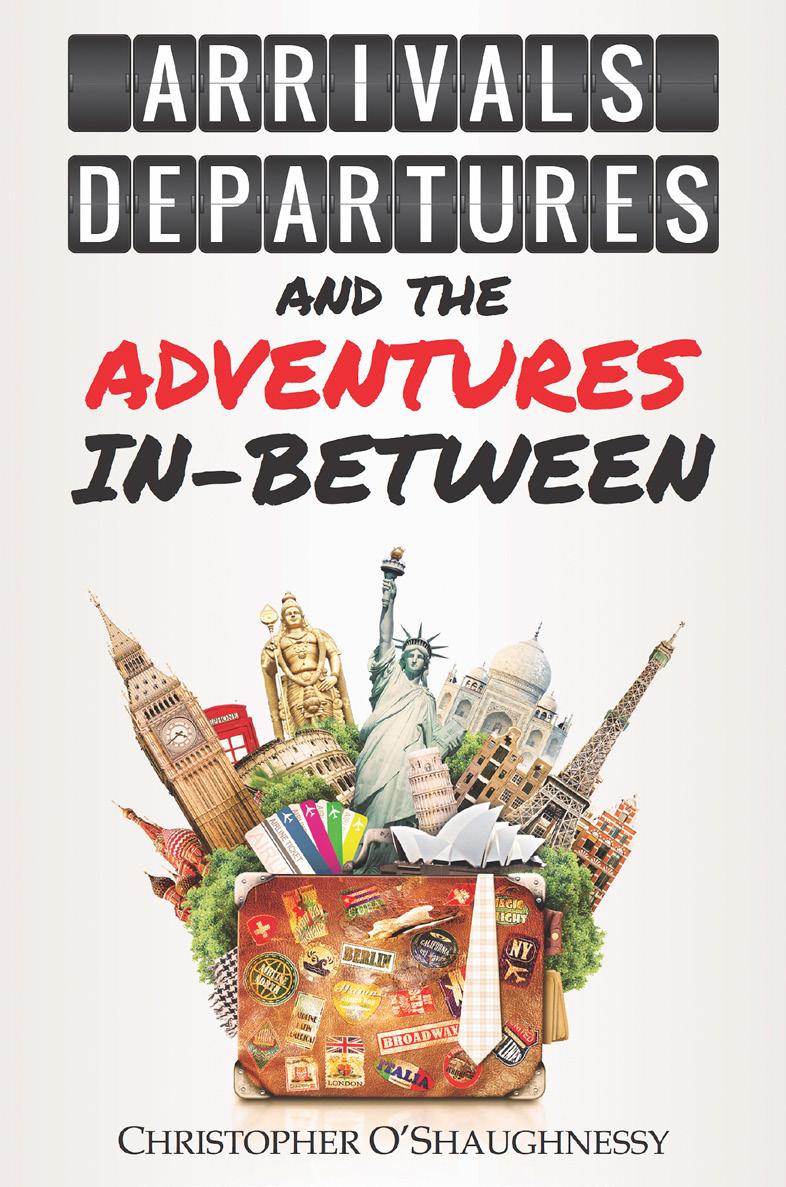
10 minute read
Spotlight - Chris O'Shaughnessy
with CHRIS O’SHAUGHNESSY
Many of us TCKs pride ourselves on being able to tell funny, usually self-deprecating stories about our cross-cultural mishaps. I can almost guarantee that none of us do it quite so brilliantly as Chris O’Shaughnessy. But as hilarious as Chris’s stories are, they also contain satisfying nuggets of earned wisdom that lead their listeners into greater empathy and deeper self-awareness.
Advertisement
Chris O’Shaughnessy is a passionate and versatile author and speaker who uses a unique blend of storytelling, humor, and provocative insight to engage a wide array of people on topics ranging from third culture kids and the effects of globalization to building community and increasing empathy. His book, Arrivals, Departures and the Adventures In-Between (Summertime Publishing, 2016), has received high praise from students, teachers, and other experts in the TCK and international community as a resource that is both enjoyable to read at a student level and able to instill truths, insights, and skills essential to navigating life successfully as a TCK.
Born in England as a military brat to American parents, Chris O’Shaughnessy has lived and worked across the globe and, to date, has ventured to more than 100 countries. Tales from these experiences form part of the fabric of Chris’s engaging presentation and have helped shape his passion for helping the world benefit from the experience of expats, global nomads, and cross-cultural communities. We are eager to introduce him to you this month in our Spotlight feature.
"Tell us a bit about your experience as a TCK."
I was born in the UK while my father (who was born in Germany and grew up partly in France) was stationed there with the US military. My mother is American (though she’s spent so many years in the UK she sounds British at this point) and I have two younger sisters: one also born in the UK and one in the US. We moved every three to four years growing up and I continued the trend into adulthood. Transience can be a hard habit to break! I attended both local schools and US Department of Defense schools (I’m grateful for that mix) and then went to university in the UK. Collectively, I’ve lived the longest in the UK; contiguously, I’ve lived the longest in one stretch in Belgium; and after various stints in Turkey and Germany, I now rotate between the US, Belgium, Singapore, and the UAE as my main “headquarters.” I’ve managed to squeeze in about 105 other countries in the form of various moves or other travels, so I’m only about halfway done with the world!

"When did you discover you were a TCK? When did you apply that label/identity to yourself?"
I didn’t learn the term TCK until I was in university. I sat through a presentation where the speaker gave a definition for those who grow up amidst multiple cultures in transience. She then proceeded to point out all of the difficulties that come with a TCK upbringing. I remember feeling a strange mix of relief—there was a name for my experience (as I’d already realized I wasn’t easily categorized by a lot of common systems like having a hometown or even identifying solely with a nationality)— but I also felt some anxiety since the speaker was dishing out (far too accurately) all of the struggles I was experiencing. It felt pretty vulnerable to have challenges I hadn’t even been able to name listed out on a PowerPoint presentation amidst a crowd of people. I was genuinely scared that I would be called to the front of the auditorium as an exhibit for all to see: a chronic case of TCK-ness.
"How do you see your TCK-ness impacting your life today, either positively or negatively?"
In hindsight, my initial introduction to being a TCK, with its focus on the challenges, actually did me a lot of good. I realized that most of my friends and the people I’d grown up with were TCKs, and while I recognized the struggles we faced, I felt there also had to be strengths as well (and obviously there are plenty). No matter how you grow up, there are strengths and challenges. Being a TCK is no different, just sometimes a bit harder to define. I decided I wanted to help empower my fellow TCKs with the language and framework to process intellectually what they were experiencing intuitively: the good and the bad, the strengths and the challenges, the embarrassing stories, the triumphs and mishaps, and the valuable experiences—and I wanted to do it in an entertaining way. I’ve always loved stories and valued the power of laughter, so why not mix it all together?
"Do you keep up with other TCK friends or find other ways to stay connected to the tribe?"
I’m fortunate that I get to travel quite a bit while speaking, so I make a point to stop in on friends in the area wherever I am. It is such an incredible gift to know people who are spread out all over the place and who keep moving themselves! I’ve visited some friends in five or six different “homes” as they continue to journey as well. Social media has done a lot to help stay connected, but I’m especially fond of apps like “Marco Polo” that make it easy to record quick video messages. That format makes it so much easier to communicate convenient bite-sized bits frequently and I find it really helps maintain relationships.

"What do you most enjoy about connecting with other TCKs?"
I stumbled across a relatively newly created word, exulansis, which means “The tendency to give up trying to talk about an experience because people can’t relate to it.” What I love about connecting with other TCKs is that it’s often anti-exulansis! It can be pretty invigorating to have someone “get” you because they understand aspects of your life that are often lost on others. Amidst the pandemic, it’s hard for many people to understand why being unable to travel is such a big deal to me. I sound pretty pretentious bemoaning how it’s been months since I’ve been on a plane to people who fly maybe once a year. Fellow TCKs know that things like this can be a real struggle if you’ve grown up on the move!
"Have you struggled with or embraced the idea of 'settling down' in one location? What does that look like for you?"
I think I’ve learned to settle down in my own way. It took me a while, but I realized my “normal” involved regular changes of scenery and people—and that is okay. Some people get a sense of security from routine and a home base. I get a sense of security from expecting some degree of change. I think I’ve learned to appreciate the balance that’s right for me. I still have about four home bases I use throughout the year: Belgium, the US, the UAE, and Singapore; but my home in the US has become the main one. I like being home long enough to want to travel, and traveling long enough to appreciate coming home. I think it’s a healthy balance, even if it isn’t a traditional version of “settling down.”
"If you are married, did you marry another TCK?"
I married a lovely Canadian woman named Joy. She lives up to her name! Canada is a bit of a mix between the US and the UK in some ways. Those happen to be two of my biggest cultural influences growing up, so we have a lot in common. Getting into a relationship, I was very upfront with the fact that I was a TCK and that my “normal” would probably look less stable than a non-TCK’s. Joy has been remarkable in being willing to adapt, and I’ve learned a lot from her as far as stability. She says that I bring a sense of adventure and I am grateful that she brings an appreciation for consistency.
~David C. Pollock
"What do you wish you had known growing up as a TCK? What supports do you wish you had had access to?"
I didn’t learn the term TCK until I was in college. While it was comforting to know there was language to describe my circumstances and experiences, it was framed in a pretty negative way—highlighting only the challenges. While it was helpful to know the struggles people like me faced (and, therefore, work to address them), I really would have loved to know the strengths as well! Over the years I’ve come to appreciate that every culture and every way of growing up has strengths and challenges and nobody gets to choose their own upbringing. I often have to remind parents who fear they’re ruining their children by raising them as TCKs that they themselves didn’t get a say in their upbringing—nobody does. Some TCKs would rather have grown up in a more traditional manner; some people who grew up in cities wish they had been raised on a farm; some people raised in small towns wish they’d grown up seeing the world. Nobody gets to choose—we all make the most of the experience we were born into. I feel like the earlier we understand that concept, the sooner we can hone in on making the most of our own experiences and using them to help others.
"What do you see as changing concerns/issues for current and future TCKs?"
I strongly believe that as the world continues to globalize, the TCK experience is becoming more and more common. The strengths we have, everyone will soon need. The challenges we face, everyone will soon be facing. As a simple example, TCKs often struggle with conflict resolution because if you grow up in transience, you don’t have as much pressure to fix things; you can just leave and find new relationships. Now social media has made relationships easier to dispose of—if you get into an argument you can just unfriend, unfollow, or block someone— so mainstream culture is losing its conflict resolution abilities as well. My sincere hope is that as TCKs we’ll do the work to become bridge builders in a world that is aligning more and more with our experience. What a lost opportunity it would be not to make the most of the fact that in many ways we’re a preview of coming attractions! I also hope that as TCKs become less “unique,” we strive to forge identity in an inclusive way. What used to set us apart from more traditional upbringings is blurring into a more common experience. There’s a danger that this registers as a loss of identity and people might overcompensate by building stronger boundaries between “us” and “them.” Really, identity is more complicated for everyone now. Rather than hunker down in an isolated TCK camp, I hope we share our experience and use it to bring people together. The world is in desperate need of connection.

"What is the greatest impact the COVID-19 pandemic has had on your life?”
The pandemic has made me realize how much travel was linked to so many areas of my life. For years now I have always had a flight coming up within a matter of weeks and this provided a natural set of deadlines. Without it, I’ve had to recalibrate my motivation. I’ve also had to get used to being around people for much longer stretches of time than I’m used to. Anyone can be charming for a few weeks, but longer than that means you have to work harder on conflict resolution skills, patience, and loads of other healthy but challenging things. The current situation has also highlighted how intertwined the world really is. Now more than ever, the actions of people geographically spread across the planet have knock-on effects everywhere. I honestly think the role of TCKs as bridge builders is only going to grow as we emerge from this pandemic and have to forge new ways to cooperate.

Chris O’Shaughnessy

Purchase Chris’s book:
Arrivals, Departures and the Adventures In-Between, on Amazon: http://www.chris-o.com/book
Other Links:
Website: http://www.chris-o.com

Twitter: http://www.twitter.com/chrisosh
Instagram: http://www.instagram.com/ lordchristophero
Facebook: http://www.facebook.com/ chrisotalks
YouTube: http://www.youtube.com/ lordchristophero



